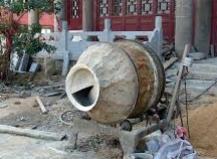In order to know the meaning of the term cement, it is necessary, first of all, to discover its etymological origin. In this case, we can state that it is a word that comes from Latin, exactly from “caementun”, which is the contraction of “caedimentum”. This term emanates from the Latin verb “caedere”, which is synonymous with “cut”.
The term cement refers to a mixture composed of various calcareous substances and clay . This mixture is cooked and then ground: when water is added and solidification occurs, it hardens.
 Cement is a binder since it allows various materials to be joined and given cohesion through chemical transformations. If sand and/or gravel is added, a mixture called concrete is obtained, widely used in the field of construction.
Cement is a binder since it allows various materials to be joined and given cohesion through chemical transformations. If sand and/or gravel is added, a mixture called concrete is obtained, widely used in the field of construction.
Before Christ , the Romans and Greeks already used cement. In this case, the material used to be of pozzolanic origin (because it came from volcanic rocks known as pozzolans). Over the years, cement of clay origin began to be used.
Currently, cement that combines calcareous substances and clay is called hydraulic cement . Among them, the most popular is Portland cement or Portland cement , whose grayish color is reminiscent of the tone of the stones obtained from the quarries of the island of Portland ( England ).
In addition to all of the above, we have to establish that if cement has become a very common material in society in general, it is due to the advantages it brings. We are referring to positive aspects such as the following:
-It is very resistant, so it offers great service and durability.
-Can be molded. Hence, it becomes a great material when it comes to achieving very specific results.
-It has great versatility, so it can be used in all types of constructions and buildings.
Its durability, its economic cost and even its adhesive properties are other characteristics that make cement a material that is worth taking into account.
Within the field of literature it has been used on numerous occasions to give titles to different works. A good example of this is the novel titled “Cement Garden”, which was written in 1978 by the writer Ian McEwan and which years later would be brought to the big screen by the filmmaker Andrew Birkin.
It tells the complicated life of four brothers who, faced with the death of their parents, decide to hide the death of one of them to prevent them from being declared orphans and separated.
Due to the hardness of the cement once it solidifies, in some regions the expression “cement face” is used to refer to someone who is cheeky (or hard-faced): someone who is shameless, who is not ashamed.
Cemento , on the other hand, was the name of a famous nightclub in the City of Buenos Aires ( Argentina ) created by businessman Omar Chabán . Inaugurated in 1985 and closed in 2004 , it was an emblematic place for Argentine rock , where bands such as Patricio Rey y sus Redonditos de Ricota , Bersuit Vergarabat , Los Violadores , Attaque 77 and Los Ratones Paranoicos took their first steps. The closure of Cemento occurred after the tragic fire at República Cromañón , another nightclub in Chabán .
